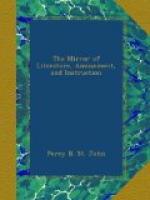* * * * *
USEFUL KNOWLEDGE.
The sweat of the brow is not favourable to the operations of the brain; and the leisure which follows the daily labour of the peasant and manufacturer, will, even if no other demands are made upon it, afford but little scope for the over acquisition of knowledge. Long will it be ere the English husbandman renounces for study the pleasures of his weekly holiday, and long may it be ere the Scottish peasant be withdrawn by a thirst for knowledge from the duties of his Sabbath, and from the simple rights of his morning and evening sacrifice.—Foreign Rev.
* * * * *
MR. CANNING.
A beautiful medal in memory of this celebrated statesman, has lately been struck at Paris, under the direction of M. Girard.
* * * * *
NATURE AND ART.
It is curious enough that people decorate their chimney-pieces with imitations of beautiful fruits, while they seem to think nothing at all of the originals hanging upon the trees, with all the elegant accompaniments of flourishing branches, buds, and leaves—Cobbet’s English Gardener.
* * * * *
THE KING OF PRUSSIA
Lives in comparative retirement, in a small palace fitted up with the greatest simplicity, and his bed is really not better than that usually allotted to a domestic in England. His study is quite that of an official man of business. He has a large map of his own dominions; and in each town where troops are stationed he fixes a common pin, and on the head of the pin is a small bit of card, on which are written the names of the regiments, their numbers, and commanding officers, in the town. He thus, at any moment, can see the disposition of his immense army, which is very essential to such a government as Prussia, it being a mild despotic military system. He has a most excellent modern map of the Turkish provinces in Europe, and upon this is marked out every thing that can interest a military man. A number of pins, with green heads, point out the positions of the Russian army; and in the same manner, with red-and-white-headed pins, he distinguishes the stations of the different kinds of troops of the Turkish host.—Literary Gazette.
THE OPERA OF “OTELLO.”
Othello is altogether unsuited to the lyrical drama, and supposing the contrary, Rossini, of all composers, was the most unfit to treat such a subject in music. The catastrophe in the English tragedy is necessary; we see it from the beginning as through a long and gloomy vista. We weep, or shudder, we draw a long sigh of despair, and feel that it could not have been otherwise. But in the opera, Othello is a ruffian, without excuse for his crime. We have suddenly a beautiful woman running distracted about the stage to a symphony—and a very noisy symphony—of violins, and butchered before our eyes to an allegro movement.—Foreign Review.




